Unit 3 Festivals and customs Grammar and usage (教学课件)-高中英语译林版(2020)必修第二册(共43页PPT)
文档属性
| 名称 | Unit 3 Festivals and customs Grammar and usage (教学课件)-高中英语译林版(2020)必修第二册(共43页PPT) | 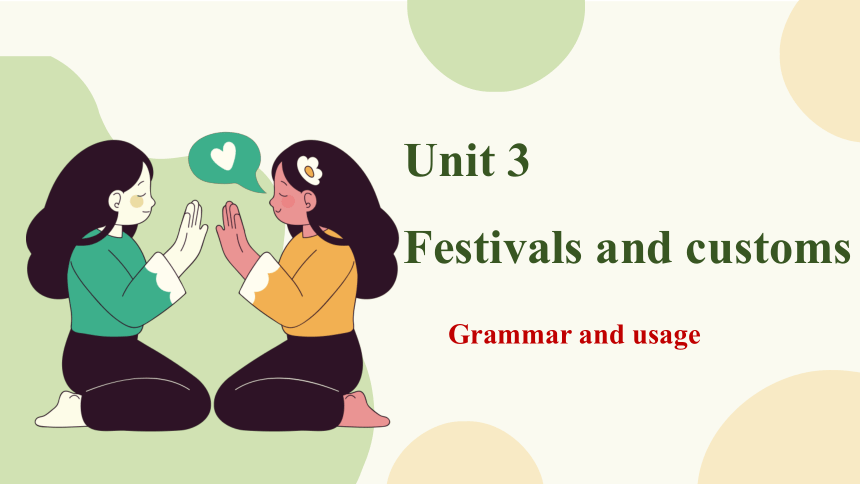 | |
| 格式 | pptx | ||
| 文件大小 | 47.7MB | ||
| 资源类型 | 试卷 | ||
| 版本资源 | 牛津译林版(2019) | ||
| 科目 | 英语 | ||
| 更新时间 | 2025-07-28 09:36:58 | ||
图片预览

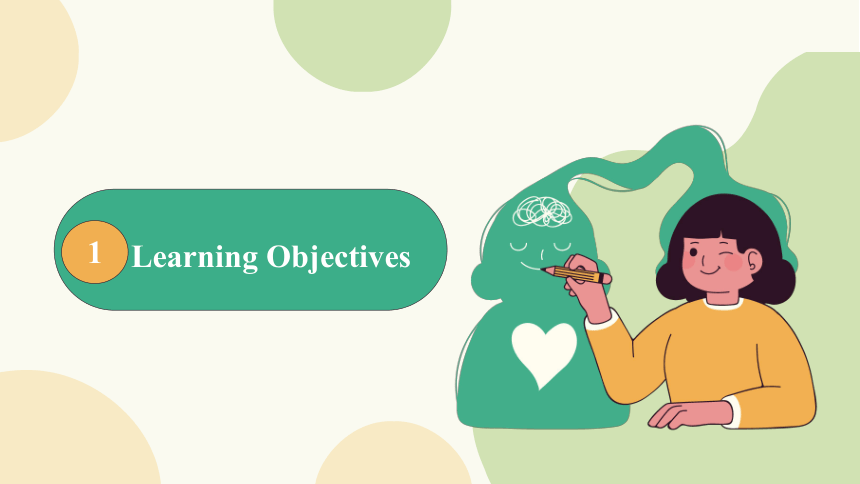
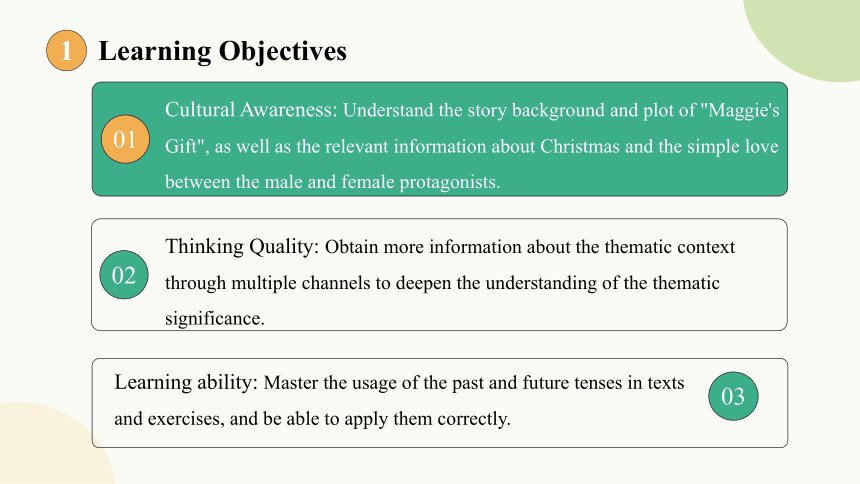
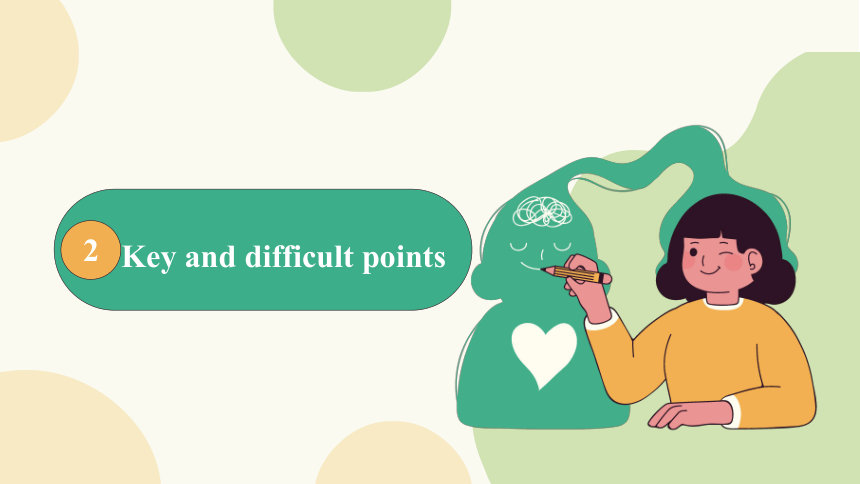
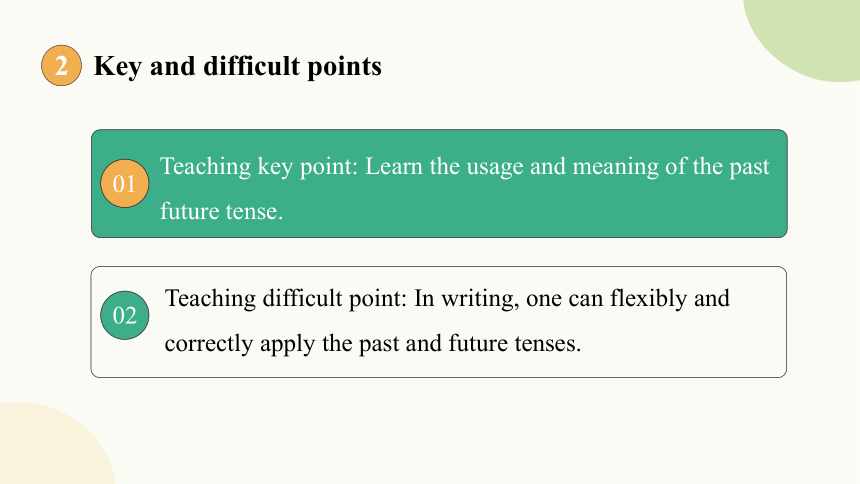
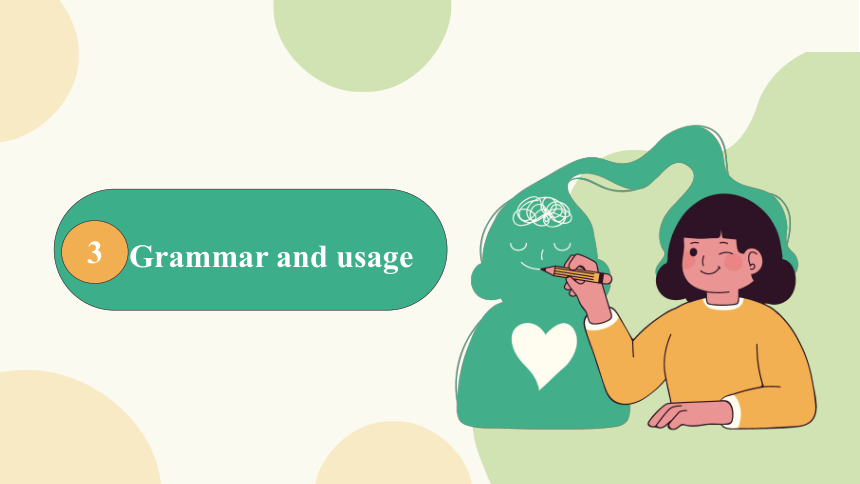
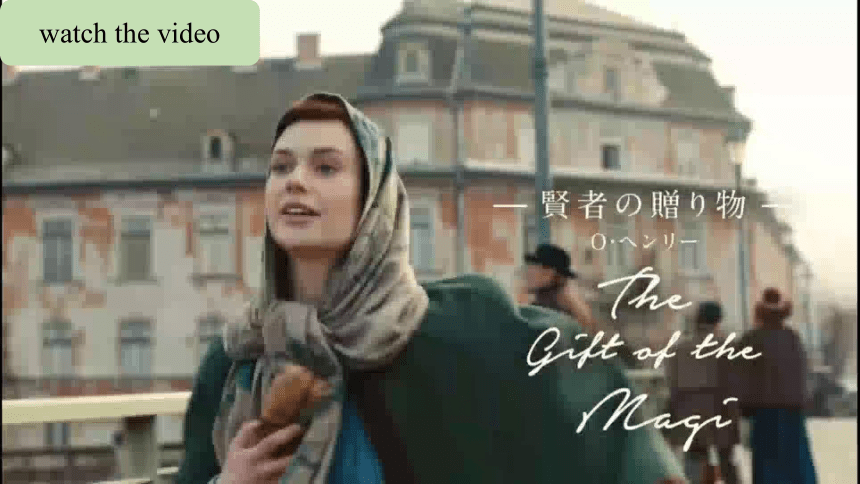
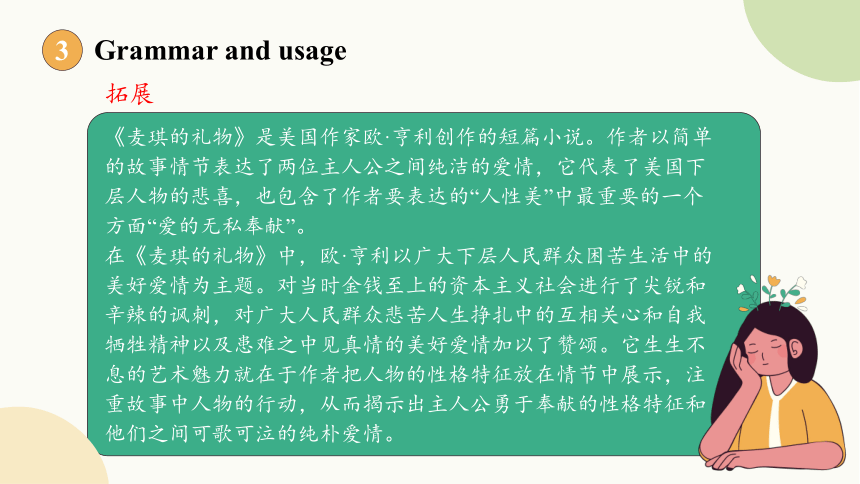
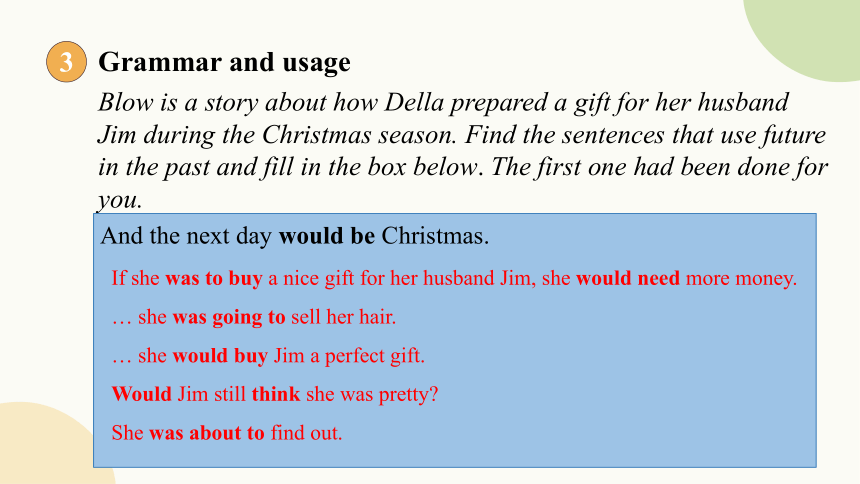
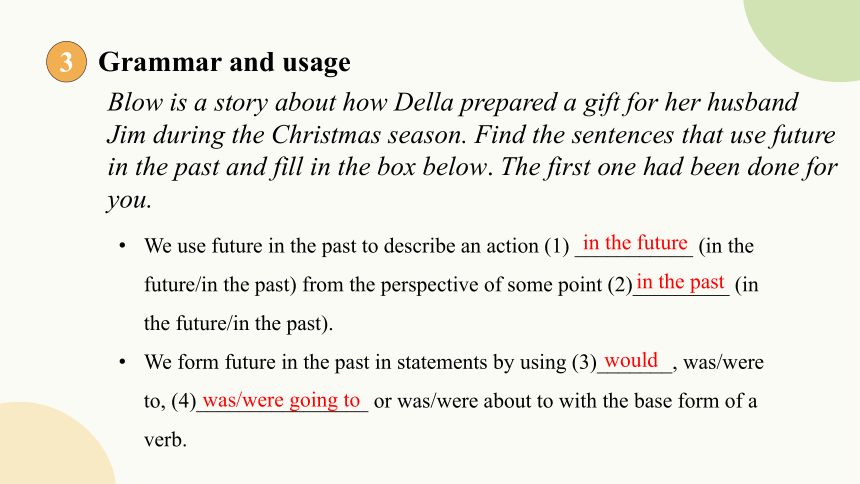
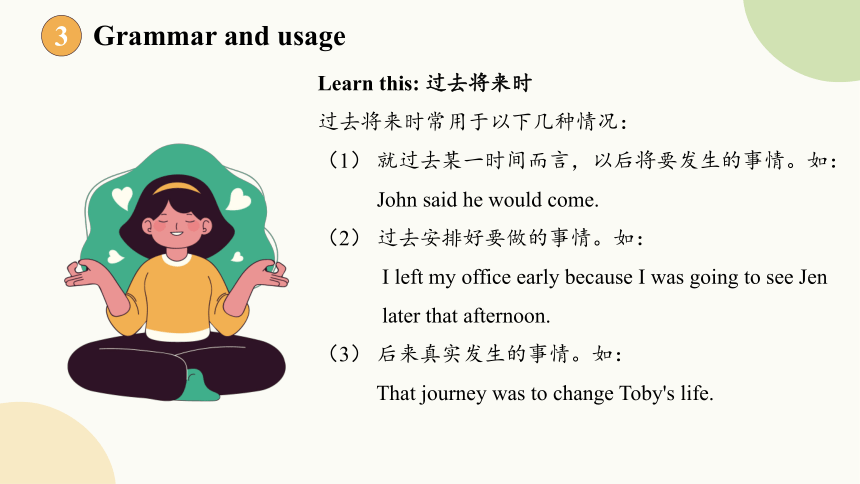
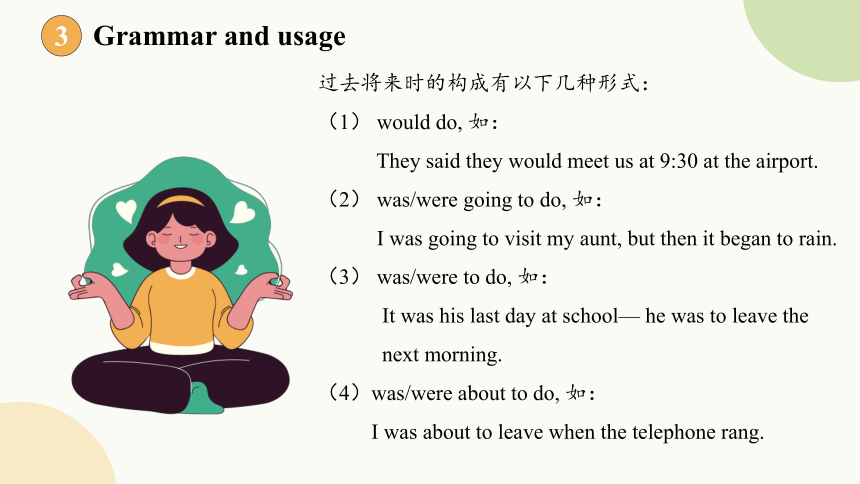
文档简介
(共42张PPT)
Unit 3
Festivals and customs
Grammar and usage
Learning Objectives
1
1
Learning Objectives
01
02
Thinking Quality: Obtain more information about the thematic context through multiple channels to deepen the understanding of the thematic significance.
Cultural Awareness: Understand the story background and plot of "Maggie's Gift", as well as the relevant information about Christmas and the simple love between the male and female protagonists.
03
Learning ability: Master the usage of the past and future tenses in texts and exercises, and be able to apply them correctly.
Key and difficult points
2
2
Key and difficult points
01
02
Teaching difficult point: In writing, one can flexibly and correctly apply the past and future tenses.
Teaching key point: Learn the usage and meaning of the past future tense.
Grammar and usage
3
3
Grammar and usage
watch the video
拓展
3
Grammar and usage
《麦琪的礼物》是美国作家欧·亨利创作的短篇小说。作者以简单的故事情节表达了两位主人公之间纯洁的爱情,它代表了美国下层人物的悲喜,也包含了作者要表达的“人性美”中最重要的一个方面“爱的无私奉献”。
在《麦琪的礼物》中,欧·亨利以广大下层人民群众困苦生活中的美好爱情为主题。对当时金钱至上的资本主义社会进行了尖锐和辛辣的讽刺,对广大人民群众悲苦人生挣扎中的互相关心和自我牺牲精神以及患难之中见真情的美好爱情加以了赞颂。它生生不息的艺术魅力就在于作者把人物的性格特征放在情节中展示,注重故事中人物的行动,从而揭示出主人公勇于奉献的性格特征和他们之间可歌可泣的纯朴爱情。
3
Grammar and usage
Blow is a story about how Della prepared a gift for her husband Jim during the Christmas season. Find the sentences that use future in the past and fill in the box below. The first one had been done for you.
And the next day would be Christmas.
If she was to buy a nice gift for her husband Jim, she would need more money.
… she was going to sell her hair.
… she would buy Jim a perfect gift.
Would Jim still think she was pretty
She was about to find out.
3
Grammar and usage
Blow is a story about how Della prepared a gift for her husband Jim during the Christmas season. Find the sentences that use future in the past and fill in the box below. The first one had been done for you.
We use future in the past to describe an action (1) ___________ (in the future/in the past) from the perspective of some point (2)_________ (in the future/in the past).
We form future in the past in statements by using (3)_______, was/were to, (4)________________ or was/were about to with the base form of a verb.
in the future
in the past
would
was/were going to
Learn this: 过去将来时
过去将来时常用于以下几种情况:
(1) 就过去某一时间而言,以后将要发生的事情。如:
John said he would come.
(2) 过去安排好要做的事情。如:
I left my office early because I was going to see Jen
later that afternoon.
(3) 后来真实发生的事情。如:
That journey was to change Toby's life.
3
Grammar and usage
过去将来时的构成有以下几种形式:
(1) would do, 如:
They said they would meet us at 9:30 at the airport.
(2) was/were going to do, 如:
I was going to visit my aunt, but then it began to rain.
(3) was/were to do, 如:
It was his last day at school— he was to leave the
next morning.
(4)was/were about to do, 如:
I was about to leave when the telephone rang.
3
Grammar and usage
3
Grammar and usage
Complete the conversations with the correct expressions in the brackets.
Paul: I (a) ________ (visited/was about to visit) the museum with my friends last weekend. What about you
Emily: I (b) ______________ (saw/was going to see) a documentary film about the Spring Festival with Joanna on Saturday, but she didn’t feel well. So I just stayed at home.
visited
was going to see
3
Grammar and usage
Complete the conversations with the correct expressions in the brackets.
Alex: We (a) _________________ (are going to hand in/were going to hand in) our report on festivals around the world next Monday.
Colin: Yes, but I (b) _____________ (wasn’t to start/haven’t started) it yet.
Alex: You told me you (c) ______________ (would work on/worked on) it all day yesterday.
Colin: Oh, I (d) _______________ (was about to start/would start) when
my cousin (e) ______ (would come/came) over.
are going to hand in
haven’t started
would work on
was about to start
came
3
Grammar and usage
Blow is a story about Jim’s gift for plete the story with the correct verbs in the box blow, using future in the past. Some verbs can be used more than once.
make think be sell
Jim was shopping for a gift for his wife Della. The next day (1) _________ Christmas. With an income of twenty dollars per week, life was hard for the couple, but Jim wanted to buy a perfect gift for Della. He thought of the beautiful set of combs on show in one of the shop windows on Broadway. Della had wanted those combs for so long. Tomorrow, Jim decided, he (2) ___________________________ Della’s dream come true.
would be
was going to make/would make
3
Grammar and usage
Blow is a story about Jim’s gift for plete the story with the correct verbs in the box blow, using future in the past. Some verbs can be used more than once.
make think be sell
Jim looked at the gold watch that had been his father’s and his grandfather’s. He and Della owned two things which they were both very proud of. One was Jim’s gold watch, and the other was Della’s beautiful hair. Jim already knew what he had to do: he (3) _______________________ his watch.
would sell/was going to sell
3
Grammar and usage
Blow is a story about Jim’s gift for plete the story with the correct verbs in the box blow, using future in the past. Some verbs can be used more than once.
make think be sell
That afternoon, Jim sold the watch, went to the shop for the combs and returned home with a package in his pocket. He was sure that they (4) ______________________ the most wonderful gift for Della. Jim was excited about what she (5) __________________________ when she saw her gift the next day.
would be/were going to be
would think/was going to think
3
Grammar and usage
What do you think Della and Jim would do when they found out what had happened Write an ending for the story using future in the past.
Sample
Della arrived home and admired Jim’s watch chain. She could not wait to see how Jim would react when he saw it the next morning. What was she going to say about her hair, though She had to think of something. Just then, Jim opened the front door.
“Oh!” said Della in surprise, trying to hide the chain. “I didn’t think you were going to be back so soon. I was about to take a shower.” She tried to get away to the bathroom.
“What’s that ” asked Jim. He came closer. “My word! And what on earth have you done to your hair ”
3
Grammar and usage
Sample
“I was going to wait until tomorrow to give this to you, but you’ve seen it now,” Della said. “I sold my hair to buy you a new chain for your watch.”
Jim looked at her with a loving smile, but there was also sadness in his eyes.
“What’s wrong ” asked Della.
“I thought I would surprise you for Christmas too,” said Jim. “So I sold my watch to get you these.” He held out the combs.
Della was speechless. She smiled back at Jim, and they held each other for a long time. Although their gifts had not worked out as planned, they were to be together happily for Christmas, and that was all that mattered.
Grammar
4
4
Grammar
Future in the past 过去将来时
1.定义:过去将来时表示在过去某个时间看将要发生的动作或存在的状态。即: 过去将来时是“立足过去,着眼未来”的一种时态。
例句:I heard that they were going to return
to Shanghai soon.
我听说他们不久要回到上海。
过去将来时常用于宾语从句和间接引语中。
例句:They never knew that population would become a big
problem.
他们从来都不知道人口问题将会成为一个大问题。
2. 过去将来时的构成
4
Grammar
肯定句:(1) 主语+be (was或were) going to+动词原形+其它
(2) 主语+would+动词原形+其它
(3) was/were+动词不定式
否定句:(1) 主语+be not (wasn't或weren't) going to+动词原形+其他
(2) 主语+would not+动词原形 +其它
疑问句:(1) Be (Was或Were) +主语+going to+动词原形+其它
(2) Would+主语+动词原形+其它
被动语态 (1) would + be + 动词的过去分词 (done)
(2) was / were +going to be + 动词的过去分词 (done)
3. 过去将来时的基本结构
(1) would + 动词原形,适用于各种人称,常表示按计划、预测或习惯性的将来动作。
例句:He said he would come to the party.
他说他会来参加派对。
(2) was/were going to + 动词原形,强调过去计划好要做的事,或根据当时情况判断即将发生的事。
例句:She told me she was going to buy a new car.
她告诉我她打算买辆新车。
It looked like it was going to rain.
当时看起来要下雨了。
4
Grammar
3. 过去将来时的基本结构
(3) was/were + 动词不定式 (to do),多表示过去安排好的将来动作,常用于正式语境。
例句:The train was to leave at 8 o'clock.
火车原定 8 点出发。
(4) 过去进行时表过去将来,少数瞬间动词 (如 come, go, leave, start 等)的过去进行时可表示过去计划好的将来动作。
例句:He said he was leaving for Beijing the next day.
他说他第二天要去北京。
4
Grammar
4. 过去将来时的用法
(1) “would +动词原形”表示从过去观点看将要发生的事。
例句:He said he would come to see me.
他说他要来看我。
He told me he would go to Beijing.
他告诉我他将去北京。
4
Grammar
4. 过去将来时的用法
(2) “was / were going to +动词原形”常可用来表示过去按计划或安排即将发生的事。
例句:She said she was going to start at once.
她说她将立即出发。
I was told that he was going to return home.
他告诉我他准备要回家。
"was /were+going to+动词原形"还可表示根据当时情况判断有可能但不一定会发生某事。
例句:It seemed as if it was going to rain.
看来好像要下雨。
4
Grammar
4. 过去将来时的用法
(3) “was / were to do”表示过去按计划安排或注定要发生的事情。语气较为正式。
例句:He was to meet her at 10 on the street.
他计划十点钟在街上和她见面。
She said that they were to see their English teacher the next week.
她说他们计划下星期要去看他们的英语老师。
She said she was to tell me about the accident.
她说她计划把事故的相关情况告诉我。
4
Grammar
4. 过去将来时的用法
(4) “was / were about to +动词原形”表示过去某时正要、就要、即将做某事(该句型不与具体时间连用),但后面可以接when引导的分句。
例句:I was about to go out when Jerry arrived.
我正要出去,杰瑞来了。
I was just about to ring you up when mama called me.
我刚要给你打电话,妈妈就打电话给我了。
4
Grammar
固定句型:正打算做……这/那时……
“was/were about to do ...when ...”;
“be on the point of doing...when...”
4. 过去将来时的用法
(5) come, go, leave, arrive, start等动词可用过去进行时“was/were doing …”代替过去将来时。
例句:He said the train was leaving at six the next morning.
他说火车第二天早晨出发。
She told me she was coming to see me.
她告诉我她要来看我。
4
Grammar
4. 过去将来时的用法
(6)条件状语从句和时间状语从句中须用一般过去时代替过去将来时。
例句:I didn't know when she would come, but when she came I would
let you know.我不知道她什么时候来,但她来了我会告诉你。
(注意:第一个when引导宾语从句,可使用将来时;第二个when引导时间状语从句,只能用一般过去时代替过去将来时)
例句:The teacher said that it would be very difficult to make progress
if I didn’t work hard.
老师说,如果我不努力学习的话,就很难取得进步。
4
Grammar
4. 过去将来时的用法
(7) 用于虚拟语气中:如果主语时过去将来时,则if引导的从句只能用一般过去时表将来。
例句:If I were you, I would not do that.
如果我是你,我不会那样做。
If he was here, he would show us how to do it.
如果他在这里,他会告诉我们怎么做。
4
Grammar
Vocabulary
5
5
Vocabulary
earn vt. & vi.赚,挣得(钱等);赢得
earn one's/a living(by…) (靠……)维持生计
earn/make money 赚钱,挣钱
earn sb. sth. 为某人赢得/博得……
earn a fame/a reputation 赢得名声
earn the respect/trust of sb.=(earn sb.'s respect/trust) 赢得某人的尊敬/信任
例句:He earns his living by teaching at a language school.
他靠在语言学校教书维持生计。
练习:As a matter of fact, (earn) much money doesn’t mean happiness.
earning
5
Vocabulary
promote vt.促进,推动;促销; 提升,晋升
promote sb. to...将某人提升为……
be promoted to...被提升为……
promote sth. to...把某物推销给……
promote peace促进和平
get promoted升职
promotion n.提升,促进;升职
get/win/gain promotion得到晋升
练习:She worked hard and (promote) from a saleswoman to a manager.
was promoted
5
Vocabulary
observe vt.遵守;注意到;观察;庆祝
observe sb. do sth. 注意到某人做某事
observe sb. doing sth.. 注意到某人正在做某事
observe sb./sth. done注意到某人/某物被……
observation n.观察;监视
be under observation 受密切观察/严密监视
observer n.观察者,目击者;评论员
注意:observe sb. do sth. 的结构变为被动语态时,不定式要加上动词不定式符号to。
练习:The thief was observed (open) the window and run away.
to open
5
Vocabulary
honour n.尊敬,尊重;光荣,荣幸
vt.尊敬,尊重(某人);给予表扬
in honour of=in one’s honour为了纪念…,向…表示敬意
have the honour of doing/to do sth. 有幸做某事
It is an honour to do sth. 做某事是一件荣幸的事
be honored as...被授予……的称号
be honored for因……而受到尊敬或获得荣誉
honored adj.受尊敬的,感到荣幸的
be/feel honored to do sth. 很荣幸做某事
练习:The university honored the student with the special prize his academic excellence.
for
Exercise
6
6
Exercise
1. She was about to leave some guests came.
2. She said she (come) back the next week.
3. I was not going out tonight. I (stay) at home.
4. Were you going (watch) the football game this afternoon
5. We (fly) to Shanghai next Friday to attend an important meeting.
when
would come
was staying
to watch
were flying
语法填空
6
Exercise
完成句子
1. He in two hours to meet with his manager. (leave)
他两小时后将赴伦敦和经理会面。
2. It was told that the wedding the next Sunday. (take place)
据说婚礼将在下周日举行。
3. — What were you going to do that evening
— the baseball game on TV. (watch)
— 那天晚上你打算做什么?
— 我打算看电视上的棒球赛。
was leaving for London
was to take place
I was going to watch
Homework
7
1. Review the grammar
2. Finish the exercises after class
3. Preview the article for the next class
See you next class!
Unit 3
Festivals and customs
Grammar and usage
Learning Objectives
1
1
Learning Objectives
01
02
Thinking Quality: Obtain more information about the thematic context through multiple channels to deepen the understanding of the thematic significance.
Cultural Awareness: Understand the story background and plot of "Maggie's Gift", as well as the relevant information about Christmas and the simple love between the male and female protagonists.
03
Learning ability: Master the usage of the past and future tenses in texts and exercises, and be able to apply them correctly.
Key and difficult points
2
2
Key and difficult points
01
02
Teaching difficult point: In writing, one can flexibly and correctly apply the past and future tenses.
Teaching key point: Learn the usage and meaning of the past future tense.
Grammar and usage
3
3
Grammar and usage
watch the video
拓展
3
Grammar and usage
《麦琪的礼物》是美国作家欧·亨利创作的短篇小说。作者以简单的故事情节表达了两位主人公之间纯洁的爱情,它代表了美国下层人物的悲喜,也包含了作者要表达的“人性美”中最重要的一个方面“爱的无私奉献”。
在《麦琪的礼物》中,欧·亨利以广大下层人民群众困苦生活中的美好爱情为主题。对当时金钱至上的资本主义社会进行了尖锐和辛辣的讽刺,对广大人民群众悲苦人生挣扎中的互相关心和自我牺牲精神以及患难之中见真情的美好爱情加以了赞颂。它生生不息的艺术魅力就在于作者把人物的性格特征放在情节中展示,注重故事中人物的行动,从而揭示出主人公勇于奉献的性格特征和他们之间可歌可泣的纯朴爱情。
3
Grammar and usage
Blow is a story about how Della prepared a gift for her husband Jim during the Christmas season. Find the sentences that use future in the past and fill in the box below. The first one had been done for you.
And the next day would be Christmas.
If she was to buy a nice gift for her husband Jim, she would need more money.
… she was going to sell her hair.
… she would buy Jim a perfect gift.
Would Jim still think she was pretty
She was about to find out.
3
Grammar and usage
Blow is a story about how Della prepared a gift for her husband Jim during the Christmas season. Find the sentences that use future in the past and fill in the box below. The first one had been done for you.
We use future in the past to describe an action (1) ___________ (in the future/in the past) from the perspective of some point (2)_________ (in the future/in the past).
We form future in the past in statements by using (3)_______, was/were to, (4)________________ or was/were about to with the base form of a verb.
in the future
in the past
would
was/were going to
Learn this: 过去将来时
过去将来时常用于以下几种情况:
(1) 就过去某一时间而言,以后将要发生的事情。如:
John said he would come.
(2) 过去安排好要做的事情。如:
I left my office early because I was going to see Jen
later that afternoon.
(3) 后来真实发生的事情。如:
That journey was to change Toby's life.
3
Grammar and usage
过去将来时的构成有以下几种形式:
(1) would do, 如:
They said they would meet us at 9:30 at the airport.
(2) was/were going to do, 如:
I was going to visit my aunt, but then it began to rain.
(3) was/were to do, 如:
It was his last day at school— he was to leave the
next morning.
(4)was/were about to do, 如:
I was about to leave when the telephone rang.
3
Grammar and usage
3
Grammar and usage
Complete the conversations with the correct expressions in the brackets.
Paul: I (a) ________ (visited/was about to visit) the museum with my friends last weekend. What about you
Emily: I (b) ______________ (saw/was going to see) a documentary film about the Spring Festival with Joanna on Saturday, but she didn’t feel well. So I just stayed at home.
visited
was going to see
3
Grammar and usage
Complete the conversations with the correct expressions in the brackets.
Alex: We (a) _________________ (are going to hand in/were going to hand in) our report on festivals around the world next Monday.
Colin: Yes, but I (b) _____________ (wasn’t to start/haven’t started) it yet.
Alex: You told me you (c) ______________ (would work on/worked on) it all day yesterday.
Colin: Oh, I (d) _______________ (was about to start/would start) when
my cousin (e) ______ (would come/came) over.
are going to hand in
haven’t started
would work on
was about to start
came
3
Grammar and usage
Blow is a story about Jim’s gift for plete the story with the correct verbs in the box blow, using future in the past. Some verbs can be used more than once.
make think be sell
Jim was shopping for a gift for his wife Della. The next day (1) _________ Christmas. With an income of twenty dollars per week, life was hard for the couple, but Jim wanted to buy a perfect gift for Della. He thought of the beautiful set of combs on show in one of the shop windows on Broadway. Della had wanted those combs for so long. Tomorrow, Jim decided, he (2) ___________________________ Della’s dream come true.
would be
was going to make/would make
3
Grammar and usage
Blow is a story about Jim’s gift for plete the story with the correct verbs in the box blow, using future in the past. Some verbs can be used more than once.
make think be sell
Jim looked at the gold watch that had been his father’s and his grandfather’s. He and Della owned two things which they were both very proud of. One was Jim’s gold watch, and the other was Della’s beautiful hair. Jim already knew what he had to do: he (3) _______________________ his watch.
would sell/was going to sell
3
Grammar and usage
Blow is a story about Jim’s gift for plete the story with the correct verbs in the box blow, using future in the past. Some verbs can be used more than once.
make think be sell
That afternoon, Jim sold the watch, went to the shop for the combs and returned home with a package in his pocket. He was sure that they (4) ______________________ the most wonderful gift for Della. Jim was excited about what she (5) __________________________ when she saw her gift the next day.
would be/were going to be
would think/was going to think
3
Grammar and usage
What do you think Della and Jim would do when they found out what had happened Write an ending for the story using future in the past.
Sample
Della arrived home and admired Jim’s watch chain. She could not wait to see how Jim would react when he saw it the next morning. What was she going to say about her hair, though She had to think of something. Just then, Jim opened the front door.
“Oh!” said Della in surprise, trying to hide the chain. “I didn’t think you were going to be back so soon. I was about to take a shower.” She tried to get away to the bathroom.
“What’s that ” asked Jim. He came closer. “My word! And what on earth have you done to your hair ”
3
Grammar and usage
Sample
“I was going to wait until tomorrow to give this to you, but you’ve seen it now,” Della said. “I sold my hair to buy you a new chain for your watch.”
Jim looked at her with a loving smile, but there was also sadness in his eyes.
“What’s wrong ” asked Della.
“I thought I would surprise you for Christmas too,” said Jim. “So I sold my watch to get you these.” He held out the combs.
Della was speechless. She smiled back at Jim, and they held each other for a long time. Although their gifts had not worked out as planned, they were to be together happily for Christmas, and that was all that mattered.
Grammar
4
4
Grammar
Future in the past 过去将来时
1.定义:过去将来时表示在过去某个时间看将要发生的动作或存在的状态。即: 过去将来时是“立足过去,着眼未来”的一种时态。
例句:I heard that they were going to return
to Shanghai soon.
我听说他们不久要回到上海。
过去将来时常用于宾语从句和间接引语中。
例句:They never knew that population would become a big
problem.
他们从来都不知道人口问题将会成为一个大问题。
2. 过去将来时的构成
4
Grammar
肯定句:(1) 主语+be (was或were) going to+动词原形+其它
(2) 主语+would+动词原形+其它
(3) was/were+动词不定式
否定句:(1) 主语+be not (wasn't或weren't) going to+动词原形+其他
(2) 主语+would not+动词原形 +其它
疑问句:(1) Be (Was或Were) +主语+going to+动词原形+其它
(2) Would+主语+动词原形+其它
被动语态 (1) would + be + 动词的过去分词 (done)
(2) was / were +going to be + 动词的过去分词 (done)
3. 过去将来时的基本结构
(1) would + 动词原形,适用于各种人称,常表示按计划、预测或习惯性的将来动作。
例句:He said he would come to the party.
他说他会来参加派对。
(2) was/were going to + 动词原形,强调过去计划好要做的事,或根据当时情况判断即将发生的事。
例句:She told me she was going to buy a new car.
她告诉我她打算买辆新车。
It looked like it was going to rain.
当时看起来要下雨了。
4
Grammar
3. 过去将来时的基本结构
(3) was/were + 动词不定式 (to do),多表示过去安排好的将来动作,常用于正式语境。
例句:The train was to leave at 8 o'clock.
火车原定 8 点出发。
(4) 过去进行时表过去将来,少数瞬间动词 (如 come, go, leave, start 等)的过去进行时可表示过去计划好的将来动作。
例句:He said he was leaving for Beijing the next day.
他说他第二天要去北京。
4
Grammar
4. 过去将来时的用法
(1) “would +动词原形”表示从过去观点看将要发生的事。
例句:He said he would come to see me.
他说他要来看我。
He told me he would go to Beijing.
他告诉我他将去北京。
4
Grammar
4. 过去将来时的用法
(2) “was / were going to +动词原形”常可用来表示过去按计划或安排即将发生的事。
例句:She said she was going to start at once.
她说她将立即出发。
I was told that he was going to return home.
他告诉我他准备要回家。
"was /were+going to+动词原形"还可表示根据当时情况判断有可能但不一定会发生某事。
例句:It seemed as if it was going to rain.
看来好像要下雨。
4
Grammar
4. 过去将来时的用法
(3) “was / were to do”表示过去按计划安排或注定要发生的事情。语气较为正式。
例句:He was to meet her at 10 on the street.
他计划十点钟在街上和她见面。
She said that they were to see their English teacher the next week.
她说他们计划下星期要去看他们的英语老师。
She said she was to tell me about the accident.
她说她计划把事故的相关情况告诉我。
4
Grammar
4. 过去将来时的用法
(4) “was / were about to +动词原形”表示过去某时正要、就要、即将做某事(该句型不与具体时间连用),但后面可以接when引导的分句。
例句:I was about to go out when Jerry arrived.
我正要出去,杰瑞来了。
I was just about to ring you up when mama called me.
我刚要给你打电话,妈妈就打电话给我了。
4
Grammar
固定句型:正打算做……这/那时……
“was/were about to do ...when ...”;
“be on the point of doing...when...”
4. 过去将来时的用法
(5) come, go, leave, arrive, start等动词可用过去进行时“was/were doing …”代替过去将来时。
例句:He said the train was leaving at six the next morning.
他说火车第二天早晨出发。
She told me she was coming to see me.
她告诉我她要来看我。
4
Grammar
4. 过去将来时的用法
(6)条件状语从句和时间状语从句中须用一般过去时代替过去将来时。
例句:I didn't know when she would come, but when she came I would
let you know.我不知道她什么时候来,但她来了我会告诉你。
(注意:第一个when引导宾语从句,可使用将来时;第二个when引导时间状语从句,只能用一般过去时代替过去将来时)
例句:The teacher said that it would be very difficult to make progress
if I didn’t work hard.
老师说,如果我不努力学习的话,就很难取得进步。
4
Grammar
4. 过去将来时的用法
(7) 用于虚拟语气中:如果主语时过去将来时,则if引导的从句只能用一般过去时表将来。
例句:If I were you, I would not do that.
如果我是你,我不会那样做。
If he was here, he would show us how to do it.
如果他在这里,他会告诉我们怎么做。
4
Grammar
Vocabulary
5
5
Vocabulary
earn vt. & vi.赚,挣得(钱等);赢得
earn one's/a living(by…) (靠……)维持生计
earn/make money 赚钱,挣钱
earn sb. sth. 为某人赢得/博得……
earn a fame/a reputation 赢得名声
earn the respect/trust of sb.=(earn sb.'s respect/trust) 赢得某人的尊敬/信任
例句:He earns his living by teaching at a language school.
他靠在语言学校教书维持生计。
练习:As a matter of fact, (earn) much money doesn’t mean happiness.
earning
5
Vocabulary
promote vt.促进,推动;促销; 提升,晋升
promote sb. to...将某人提升为……
be promoted to...被提升为……
promote sth. to...把某物推销给……
promote peace促进和平
get promoted升职
promotion n.提升,促进;升职
get/win/gain promotion得到晋升
练习:She worked hard and (promote) from a saleswoman to a manager.
was promoted
5
Vocabulary
observe vt.遵守;注意到;观察;庆祝
observe sb. do sth. 注意到某人做某事
observe sb. doing sth.. 注意到某人正在做某事
observe sb./sth. done注意到某人/某物被……
observation n.观察;监视
be under observation 受密切观察/严密监视
observer n.观察者,目击者;评论员
注意:observe sb. do sth. 的结构变为被动语态时,不定式要加上动词不定式符号to。
练习:The thief was observed (open) the window and run away.
to open
5
Vocabulary
honour n.尊敬,尊重;光荣,荣幸
vt.尊敬,尊重(某人);给予表扬
in honour of=in one’s honour为了纪念…,向…表示敬意
have the honour of doing/to do sth. 有幸做某事
It is an honour to do sth. 做某事是一件荣幸的事
be honored as...被授予……的称号
be honored for因……而受到尊敬或获得荣誉
honored adj.受尊敬的,感到荣幸的
be/feel honored to do sth. 很荣幸做某事
练习:The university honored the student with the special prize his academic excellence.
for
Exercise
6
6
Exercise
1. She was about to leave some guests came.
2. She said she (come) back the next week.
3. I was not going out tonight. I (stay) at home.
4. Were you going (watch) the football game this afternoon
5. We (fly) to Shanghai next Friday to attend an important meeting.
when
would come
was staying
to watch
were flying
语法填空
6
Exercise
完成句子
1. He in two hours to meet with his manager. (leave)
他两小时后将赴伦敦和经理会面。
2. It was told that the wedding the next Sunday. (take place)
据说婚礼将在下周日举行。
3. — What were you going to do that evening
— the baseball game on TV. (watch)
— 那天晚上你打算做什么?
— 我打算看电视上的棒球赛。
was leaving for London
was to take place
I was going to watch
Homework
7
1. Review the grammar
2. Finish the exercises after class
3. Preview the article for the next class
See you next class!
